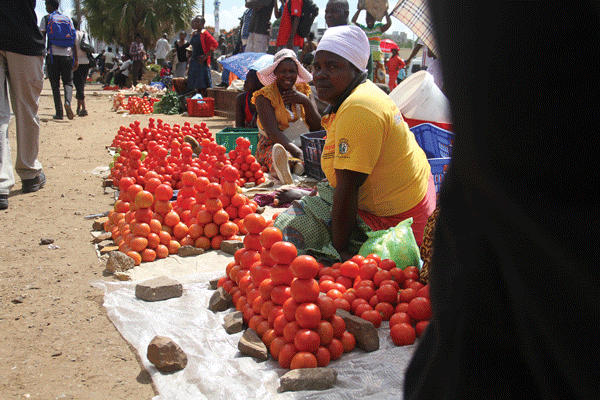
THE failure by the Zimbabwean government to provide the over two million jobs the ruling Zanu PF party promised in its 2013 election manifesto is so massive that vending — which has become the major hard landing for retrenchees and graduates — is so widespread that there is someone selling something on virtually every part of the country.
BY TAPIWA ZIVIRA
The situation has worsened due to the cash crisis, with the shrinking of the local industry forcing vendors and small-scale businesspeople to make-do with small profit margins and lower sales volumes.
The Zimbabwe Congress of Trade Unions estimates that although the rate of formal unemployment is at 85% and recently established that over 2 000 jobs were lost this year alone, it indicated that there is not going to be any economic relief anytime soon, and that more vendors will join the streets.
With such dim prospects, the growing number of vendors has forced many to come up with innovative marketing skills that include the use of megaphones to advertise their products and setting up of vending stalls at every corner during the night when municipal police knock off.
Many Zimbabweans in urban and peri-urban centres must now be familiar with the megaphones used by vendors who sell various wares, with the most interesting ones being those used by dental herb vendors and have pre-recorded chants that go like, “Vane mazino ane mhango, akaora, neanorwadza…”
But perhaps the greatest form of novelty is that of vendors, who have resorted to taking advantage of travellers, who use the major highways on public transport.
Traditionally, vendors sold their wares at major bus stations like Mbare Musika, as the buses picked up passengers. In some towns like Harare, Mutare and Masvingo, as observed by NewsDay, the vendors have since spread to virtually all parts of the city centres, clogging streets and using pavements as trading spaces.
- Chamisa under fire over US$120K donation
- Mavhunga puts DeMbare into Chibuku quarterfinals
- Pension funds bet on Cabora Bassa oilfields
- Councils defy govt fire tender directive
Keep Reading
But for people like Brian, a driver by profession, but unemployed, the magic is not in sitting on a hot sunbaked pavement and waiting for clients to pass by.
Brian goes to the clients.
“Every morning, I go to Masvingo bus terminus and I board a bus that goes either to Beitbridge or to Harare direction, and this is where I sell my goods, to passengers,” he said.
This reporter had the opportunity to travel in a bus from Harare to Masvingo, in which Mashoko was selling his wares.
As soon as the bus begun its journey, Brian — who had all along appeared calm and paid his fare like any other passenger — stood from his seat and brought out his wares that included ball point pens, chocolates, toothbrushes and toothpaste, many of which are Chinese imports.
He walked up and down the aisle, passionately using jokes and banter to ignite interest and attention from the usually haggard passengers, even suggesting that since he was a driver by profession, he could take over the bus and drive everyone safely to Masvingo.
Amid the laughter and jokes, people started buying and as the bus inched towards its first stop, in Beatrice, 50km away and about an hour later, Brian had already made well over $10.
Brian could not reveal how much he makes a day, but said he can get into more than 20 buses a day on the busy Harare-Beitbridge Highway, where there are many long distance buses that use the route to South Africa and other places in Zimbabwe.
Asked about the cash crisis, Brian admitted that the disappearance of the hard currency from the market in favour of mobile and plastic money had dented his profit levels, which he said were already narrow.
“I am a bit affected by the cash crisis, so I have to accept mobile money payments sometimes, and as you know there are always transactional charges involved and this has an impact on my already little profit margins,” he said.
According to him, when he lost his job five years ago, he got into conventional vending, selling the same condiments at a marketplace in Masvingo.
“Competition was getting tough and more vendors were coming in, and I had to be innovative. That is when I got this idea of targeting cross-border and local buses,” he said.
A father of three, Brian still has hopes of going back to his job of driving.
“It is not the best out here and I hope one day things will get better and we will all get jobs. I am not alone in this business and very soon, buses will be full of us and we will not be making any money, so the hope is in things getting better and companies opening up,” he said.
Several other vendors and beggars also get into buses to sell or beg. Although bus crews could not reveal if they had benefitted from any of the proceeds, they give full co-operation to the traders, with some buses switching off their entertainment systems to give a chance to the beggars and traders to communicate with the passengers.
The conductor, however, said they did not have a problem with anyone who used morally upright means of getting money.
“The vendors pay their fare and freely talk to passengers, so we cannot ban them from doing that since we all know things are not well in the country. For the beggars, we exempt them from paying fares because we know they are a charity case,” he said, pointing to an old, blind woman who had just got into the bus accompanied by a teenage boy.
“You see that old woman, she is waiting for the right time and you will soon see her walk accompanied down the aisle, begging for anything, and she has not paid the fare because we understand these are people in need.”











